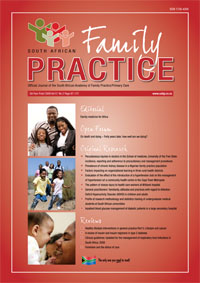Management of Type 2 Diabetes Mellitus at a Rural Hospital, Kwazulu-Natal, South Africa: Is the Management of Adult Patients with Type 2 Diabetes Mellitus Optimal?
Keywords:
diabetes mellitus type 2 adults audit rural management quality of care
Abstract
Background: Diabetes mellitus is a common chronic disease in Montebello Hospital, a district hospital in rural Kwazulu-Natal, South Africa. The high workload, lack of continuity of care and variation in clinical practice results in poor quality of care for our patients. Research has established that effective treatments and practices can reduce the complications of diabetes. Practice redesign may be necessary to achieve markedly improved chronic illness care. The aim of this study is to improve the quality of care for adult type 2 diabetics at Montebello Hospital by means of a clinical audit. Methods: A retrospective sample of 100 patients’ medical records was examined for the period 1 July 2005 until 30 June 2006. Baseline data was extracted from these records to document the following: haemoglobin A1c (HbA1c), a documented foot examination, lipid test, blood pressure reading, dilated eye examination, aspirin use, current smokers and urine test for microalbuminuria. Diabetic-specific measures and other improvement strategies were included in the management of diabetes at the hospital from 1 July 2006. A dedicated chronic care clinic was established at the outpatient department. The clinical records were filed separately. A register and appointment system was started to encourage patients to return at regular intervals. Health education about diabetes, foot care and nutrition was given to groups. A prospective audit of 215 diabetic patients’ medical records was carried out for the period 1 July 2006 to 31 December 2006 and the same data was extracted and analyzed. Results: Retrospective results of 100 records for the period 1 July 2005 to 30 June 2006 shows 23% of patients had an acceptable systolic blood pressure (SBP) < 130 mmHg, 43% of patients had diastolic blood pressure (DBP) < 80 mmHg. The clinical records were frequently incomplete with only blood pressure recordings and random blood sugar measurements being noted. The prospective results of 215 records for the period 1 July 2006 to 31 December 2006: Among the patients during this period, 148 had HbA1c levels tested. Only 10% were in the acceptable target range of HbA1c < 7% while 81% were in the ‘additional action’ range of > 8%. Only 26% of patients had SBP < 130 mmHg, 43% of patients had DBP < 80mmHg. Triglyceride (Tgl) tests were done in 85 patients and 32% of patients had acceptable Tgl < 1.5 mmol/l. Total cholesterol (TC) was done in 85 patients and 60% of patients had TC < 5 mmol/l. High density lipoprotein-cholesterol (HDL-C) was done in 51 patients and 55% of patients had HDL-C 1.2 mmol/l. There were 47 tests for low density lipoprotein-cholesterol (LDL-C) and 68% of patients had LDL-C < 3 mmol/l. During this period 11% of patients had complete foot examinations, 22% of patients had dilated eye examinations and 11% of patients were on aspirin prophylaxis. Forty five patients were assessed for nephropathy and 27% of patients had a urine albumin : creatine ratio (ACR) < 2.9, 16% of patients had ACR 3-29 (microalbuminuria) and 58% of patients had ACR 30 (proteinuria). Conclusions: In this first audit we made changes to the structure and process of care. The results from this indicate that our community is at risk for diabetes complications and serve as a benchmark for monitoring changes in diabetic care. In the next audit, we need to set realistic performance targets, focus on improving communication between provider and patient, and shift our focus from treatment and diagnosis to health education and behavior modification.
Published
2008-10-20
Section
Correspondence
By submitting manuscripts to SAFP, authors of original articles are assigning copyright to the South African Academy of Family Physicians. Copyright of review articles are assigned to the Publisher, Medpharm Publications (Pty) Ltd, unless otherwise specified. Authors may use their own work after publication without written permission, provided they acknowledge the original source. Individuals and academic institutions may freely copy and distribute articles published in SAFP for educational and research purposes without obtaining permission.

